What causes the lips to turn black or purple?
Generally, black or purple lips may be caused by cold stimulation, skin pigmentation, iron deficiency anemia, pneumonia, bronchial asthma, or other reasons. If discomfort occurs, timely medical attention is recommended. Detailed analysis is as follows:

1. Cold Stimulation
In cold environments, surface blood vessels constrict to reduce heat loss, which may slow peripheral blood circulation and increase reduced hemoglobin in the blood, causing the lips to appear purplish-black. It is important to stay warm and avoid prolonged exposure to cold environments. When going outdoors in cold weather, wearing a mask or scarf to protect the face is advisable.
2. Skin Pigmentation
Prolonged sun exposure, endocrine changes, or medication effects may lead to skin pigmentation, causing darkening of the lips. It is recommended to avoid prolonged sun exposure, pay attention to endocrine regulation, and avoid medications that may cause pigmentation.
3. Iron Deficiency Anemia
Iron deficiency anemia is usually caused by insufficient iron intake, impaired iron absorption, increased iron requirements, or excessive iron loss. When hemoglobin's oxygen-carrying capacity decreases, lips may darken or turn purplish due to hypoxia. It may also be accompanied by symptoms such as fatigue and loss of appetite. Patients may take medications such as compound ferrous sulfate granules, ferrous sulfate tablets, or iron dextran tablets under a doctor's guidance.
4. Pneumonia
Pneumonia may be caused by bacterial or viral infections leading to lung inflammation. Inflammatory stimulation may affect gas exchange, resulting in black or purple lips. Symptoms may also include fever and cough. Patients may follow medical advice to take medications such as penicillin V potassium tablets, doxycycline hyclate tablets, or fluconazole sodium chloride injection.
5. Bronchial Asthma
Bronchial asthma is a heterogeneous disease characterized by chronic airway inflammation and airway hyperresponsiveness, mainly caused by interactions between genetic and environmental factors. Bronchial spasms may lead to inadequate ventilation, causing lips to darken or turn purplish due to hypoxia. Patients may also experience wheezing and shortness of breath. Patients may take medications such as salbutamol sulfate tablets, budesonide inhalation aerosol, or montelukast sodium tablets under a doctor's recommendation.
In daily life, avoid prolonged sun exposure, manage emotions properly, avoid medications that may cause pigmentation, maintain good indoor air circulation, and prevent carbon monoxide poisoning.




